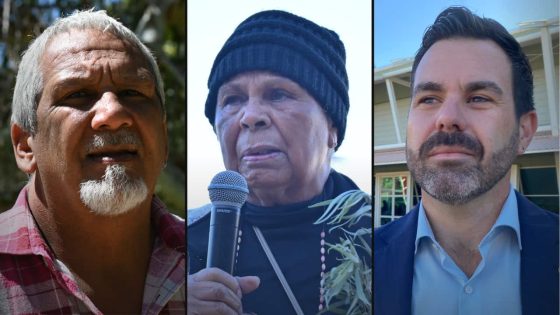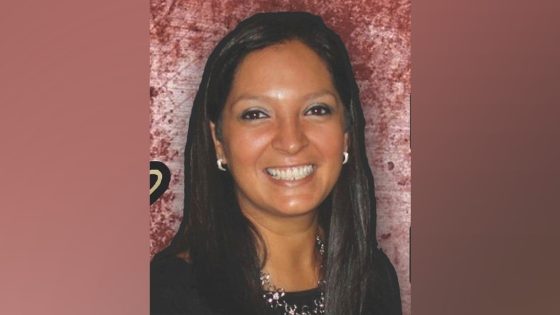More than a week after violent unrest saw the Alice Springs CBD come under a snap youth curfew, the town is quiet.
Forty-degree temperatures have plummeted to a cool and windy 25 degrees, the heat literally leaving the desert town.
Setting alight a collection of fragrant leaves in a wire fire pit for a smoking ceremony, three Arrernte Grandmothers explain their reaction to the recent special measures to stop crime.
“We weren’t consulted, we were not aware of what was happening,” says Kumalie Kngwarraye from the Strong Grandmothers Group from the Central Desert Region.
“It’s inappropriate, it’s insulting and making us feel that we’re not part of the system or the solution.”
Arrernte Elder Kumalie Kngwarraye (left), and Grandmothers Pamela Kngwarraye Lynch and Veronica Kngwarraye Lynch say they weren’t consulted on plans to impose a youth curfew in Alice Springs. Source: SBS News / Laetitia Lemke
Last Wednesday, Northern Territory Chief Minister Eva Lawler applying to anyone under 18 years of age, which would run for two weeks.
The unrest, which is believed to stem from family disputes, coincided with the funeral of a young man who died earlier this month.
Arrernte Elders: Helping the ‘Intervention generation’
Kumalie Kngwarraye delivered the Welcome to Country for the Northern Territory government’s Aboriginal Leadership and Governance Forum and NT Treaty Symposia, which started on Thursday.
She says Lawler is a grandmother, and that she should speak to Arrernte Grandmothers about the teenagers fuelling high crime rates — children she says are a product of failed federal and NT government policies.
“Today’s generation is the Intervention generation,” the Arrernte Elder says.
The federal Intervention in what John Howard’s Coalition government said was a response to allegations of child abuse across the Northern Territory.
The Grandmothers discuss the Intervention measures that moved tens of thousands of Aboriginal people from work, under the Community Development Employment Projects (CDEP) program, to welfare.
The NT government’s closure of local councils also stripped thousands of jobs from remote communities and homelands.
Kumalie Kngwarraye, Pamela Kngwarraye Lynch, and Veronica Kngwarraye Lynch deliver a smoking ceremony at the 2024 Aboriginal Leadership and Governance Forum and Treaty Symposium. Source: SBS News / Laetitia Lemke
These issues have affected the livability of remote communities and fuelled a drift into the Alice Springs town centre.
“We need to have a big summit, like this (Treaty Symposium) or something here together,” Kumalie Kngwarraye says.
“Let’s talk about it, let’s have a strategy. We are the solution for our people.”
From the community: Bringing ‘kids back to homelands’
Down the road, a drumming lesson pounds out into the courtyard at the headquarters of Children’s Ground — an organisation that supports First Nations children and families.
Elders there are mourning the loss of a family member and colleague, but agree to allow SBS News to sit in on a group discussion, rather than hold a formal interview.
They describe the level of crime on the streets as “frightening”.
“The issue is, build more facilities out in community, so kids can get occupied. There’s a basketball court, there’s a footy team and some sort of disco,” says Early Educator Amelia Kngwarraye Turner.
“Have a disco out in the community.”
Estimates from local Aboriginal organisations suggest up to 800 children are living homeless in Alice Springs. Many of those children have families and homes, the women say, but they are chronically overcrowded and unlivable.
Veronica Turner, co-director of Children’s Ground and an Arrernte Educator, says Alice Springs is in need of pathways back to remote communities and homelands.
“If everybody had a job in the town camps, none of this would happen. The kids wouldn’t be doing this, they would be seeing most of the parents working.”
Elder Catherine Turner Kngwarraye says poor government policies have created an environment where jobs are scarce, homes are overcrowded and basics like food and electricity are unaffordable for many.
Due to unemployment and poverty, role models in communities are harder to find.
Catherine Turner and Shirley Turner paint a sign for Children’s Ground. Source: SBS News / Laetitia Lemke
“The federal Intervention, since that’s been cut down, that just made the kids think they’re not much role models,” she says.
“Kids [need to go] back to homelands.”
On the current youth curfew, she seems unmoved.
“I think it’s a bit hard now, because most of us are saying ‘Why do it now?’ … because this should have been done ages ago.”
‘We have a real identity problem’
Alyawarre Arrernte man Michael Liddle says the problem in Alice Springs needs long-term solutions from governments, rather than short-term fixes.
He says young people are particularly drawn to the town but don’t understand how to live in a Western society — and don’t know their own culture, either.
This is a significant problem, according to Liddle, and one that will continue to grow if it isn’t addressed.
“I think the age group no longer want to live in community, the understanding of Country is no longer wanting to be learnt about,” he says.
“We have a real identity problem.
“What sort of talk are we going to leave behind in the years to come?”
Liddle says that, while the focus has been on frontline health and policing, Aboriginal services say they are stretched to breaking point, dealing with people’s trauma and economic disadvantage.
Alyawarre Arrernte man Michael Liddle says the problem in Alice Springs needs long-term solutions. Source: SBS News / Laetitia Lemke
Youth advocate: Need for real investment in young people
At the end of the Alice Springs mall, a bright mural fills the wall. It reads: “YOUth matter”.
Beyond murals, however, Shanaya McAdam-Bray, 18, says the town needs real investment in young people.
“Before the curfew is finished, (the government) needs to figure out a real solution that can actually help,” she says.
“How are we going to help the kids with homelessness … where are the beds? Where are the facilities to help them get out of those situations?
“How do we prevent kids going into crime as a source of enjoyment and fun? Because that’s what it is.”
McAdam-Bray is a representative for the NT on the First Nations Education Youth Advisory Group to parliament.
As local schools break for the school holidays, she says there is confusion about what the curfew means for families, and concerns the government continues to bring in punitive measures without warning or consultation.
“All the kids are usually in town, but where are they with the curfew? Are they in safe environments? No one has really taken that into account.”
A mural in Alice Springs, which reads: “YOUth matter”. Source: SBS News / Laetitia Lemke
An additional 58 police officers have been sent from Darwin to enforce the curfews and maintain peace in Alice Springs.
NT Police has reached out to neighbouring forces in South Australia for support to keep operations running in the Top End.
Deputy chief minister: Work on ‘solutions moving forward’
NT Deputy Chief Minister Chansey Paech, an Arrernte and Gurindji man, hasn’t been visible throughout the curfew, with Lawler taking the lead from Darwin.
Paech spoke for the first time on Thursday outside the NT’s first Treaty Symposium, saying there has been a mixed response to the curfew in his electorate, which covers the western half of the Northern Territory.
“If locking people up worked, the Northern Territory would be the safest place in Australia,” he said.
NT Deputy Chief Minister Chansey Paech addressed the curfew on Thursday. Source: SBS News / Laetitia Lemke
“We can’t ‘police’ our way out of these issues.
“I’ve really worked with my colleagues to say and make it clear that, as we exit the curfew period, that we are working with those Aboriginal Community-Controlled Organisations (ACCOs) to develop what the solutions are moving forward.”
He’s calling on the Commonwealth to invest in peacekeepers, community mediators and law and justice groups identified as essential in the Northern Territory Aboriginal Justice Agreement, which was signed in 2021.
The NT government is yet to decide whether the curfew will be extended.








